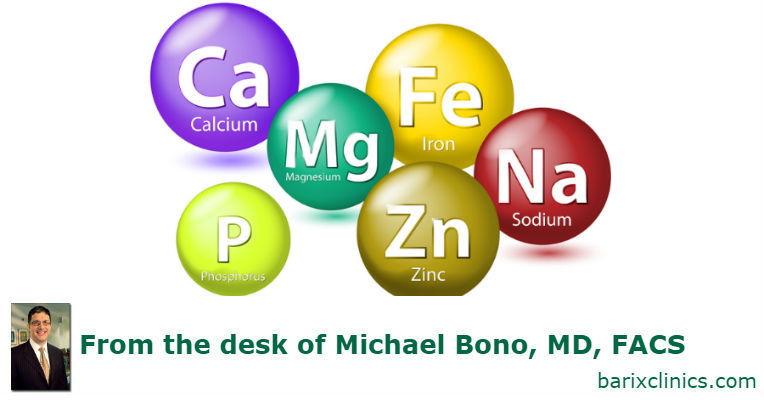Minerals
Essential nutrients are chemical elements or compounds required by humans for normal physiologic function that cannot be synthesized by the body and must be obtained from an exogenous source i.e. diet.
Essential Nutrients
- 9 Amino Acids
- 2 Fatty Acids
- 13 Vitamins
- 15 Minerals
Minerals are essential nutrients required by humans/organisms which are chemical elements. They do not include carbon, hydrogen, nitrogen, oxygen, or sulfur, which are included in organic molecules (nucleic acids, fats, sugars, proteins, etc.), which are also in the family of essential nutrients.
Mineral’s are involved in multiple biological processes in the body for normal function (structure, enzymes, hormone, and cell structure). There are two categories of minerals, Major minerals (Macrominerals), and Trace Elements (Microminerals). The top two majors, calcium and phosphorus, along with the non-mineral elements carbon, hydrogen, oxygen, and nitrogen, make up 99% of the body’s mass. The last four majors, potassium, sodium, chlorine, and magnesium make up only 0.85% of the body’s mass, for a total of 99.85% for those ten elements. The micros make up the rest, which is about 0.15% of the bodies mass, or 10 grams of mass.
Major minerals – 6
- Calcium
- Phosphorus
- Potassium
- Sodium
- Chlorine
- Magnesium
Trace elements – 9
- Iron
- Cobalt
- Copper
- Zinc
- Manganese
- Molybdenum
- Iodine
- Selenium
Insufficiency or excess of any mineral can have detrimental effects causing disease processes. Like the series on vitamins, the next series of articles I will discuss different minerals role in body function, and deficiency issues specific to the different types of bariatric surgery. Part of the bariatric surgery process is to monitor any pre existing and post operative nutrient issue for a healthy lifestyle.
From the desk of Dr. Michael Bono


